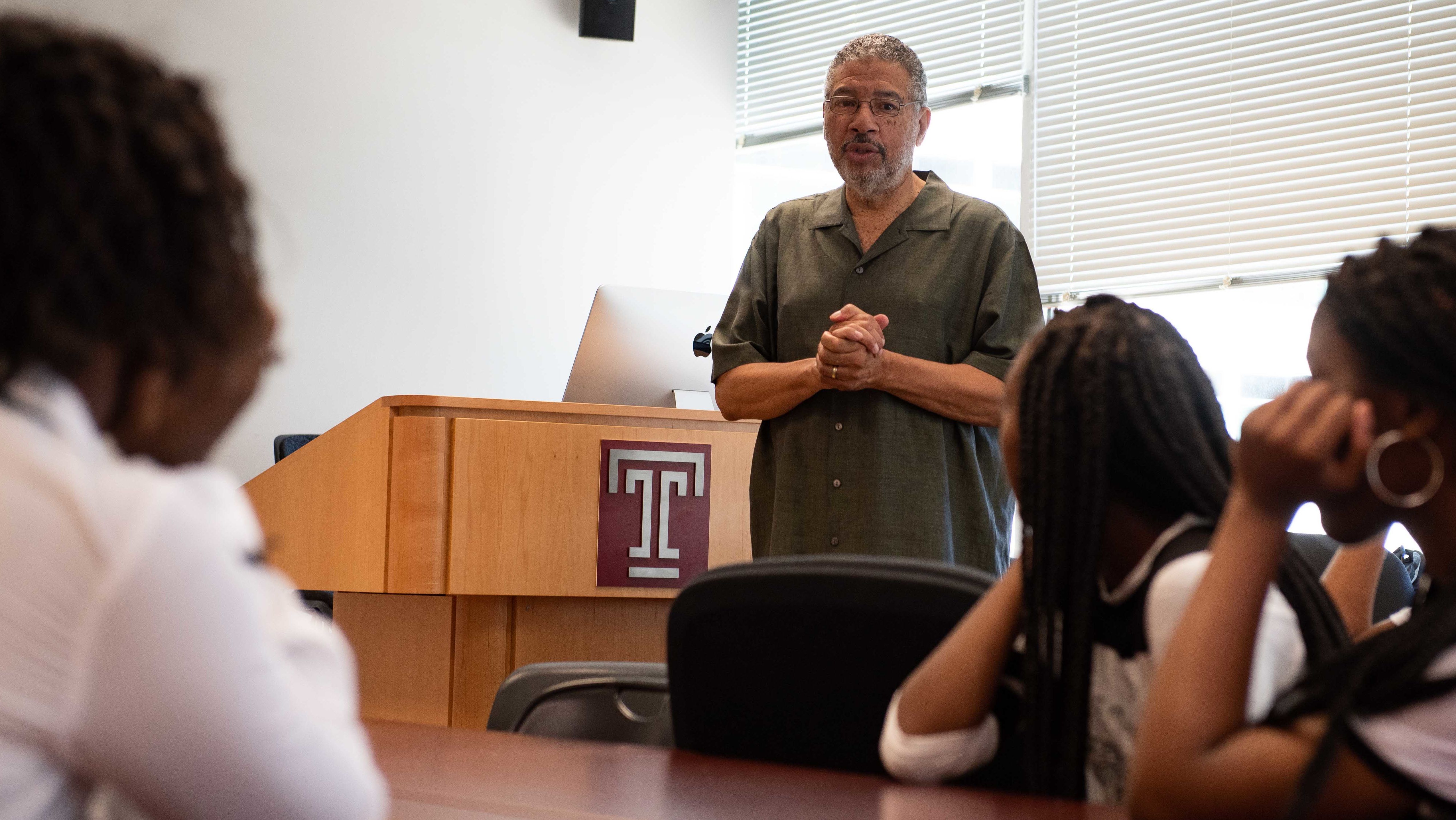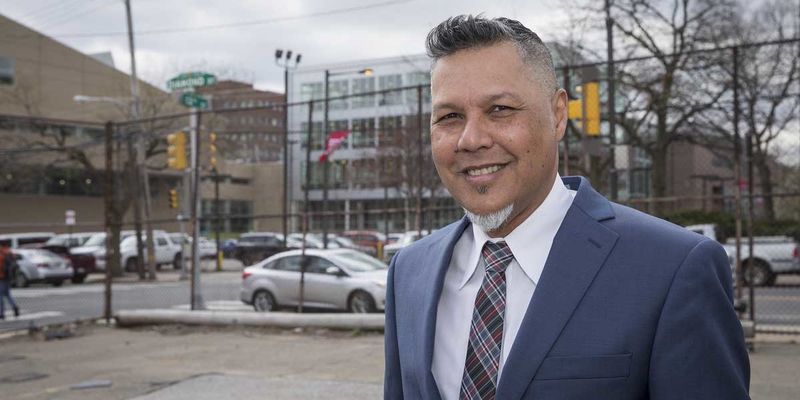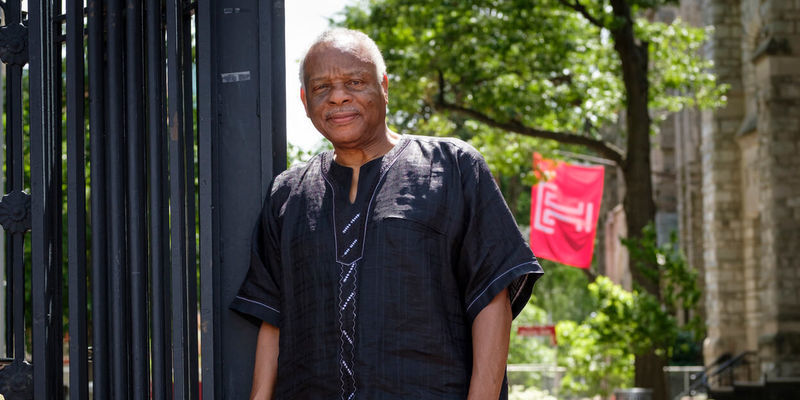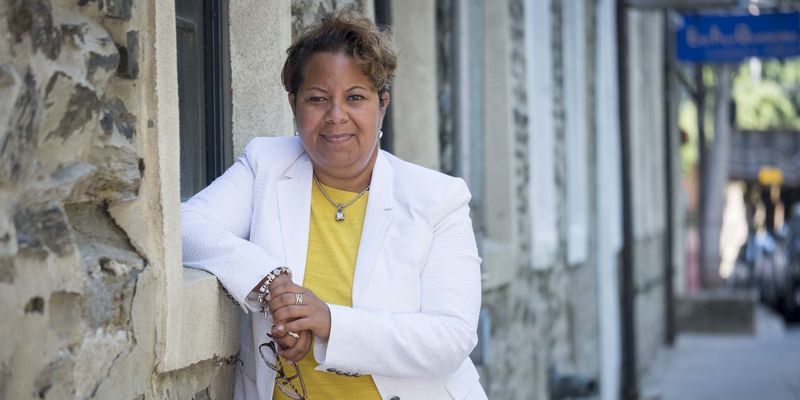‘We’ve been here before’: Journalism professor discusses covering racism, protests and police brutality
Linn Washington Jr., a professor of journalism in Klein College of Media and Communication, shares his thoughts on this moment in our history.

Since the start of his career in journalism in the 1970s, Linn Washington Jr., a professor in Temple’s Klein College of Media and Communication, has been covering issues of police brutality and racism. As an instructor teaching the journalists of the future, he infuses his own experiences into his courses.
At a time when protests against systemic racism and police brutality swept the country, bringing these problems to the forefront and demanding change, Washington took time to reflect and share his thoughts with Temple Now on where we’ve been, where we are now and where he believes we’re headed in the future.
Temple Now: Tell us about your background and career in journalism and teaching.
Linn Washington: I’ve been teaching at Temple for 23 years. I came in 1996, and that was after a career in journalism, primarily in Philadelphia. I still continue to do journalism as well as teach. My first full-time position in journalism was in 1975. I worked with The Philadelphia Tribune. Two years prior, I worked there as a columnist doing community-based entertainment—so I actually started writing for the Tribune in 1973.
TN: How do the topics you’ve covered throughout your career connect with the current movement against racism and police brutality in the U.S.?
LW: Throughout my career as a journalist, a focus of my reportage has always been matters involving race, particularly inequities in the criminal justice system, which a lot of those, in fact the majority of those, are race-based. So from the very inception of my reporting career, I’ve been covering issues like police brutality. I remember in the mid-’70s while working at the Tribune, invariably at least one person would show up at the Tribune every single week bloodied, with their clothes torn off, having been beaten by Philadelphia police, and they wanted to have their stories told. Compounding that bad situation is the fact that a large percentage of those individuals, when they came to the Philadelphia Tribune, which is the oldest African American-owned newspaper in the country, they said they had already gone to the Philadelphia Bulletin, the Inquirer and the Daily News to tell their stories, and no one would even listen to them; they couldn’t even get past the guard at the desk.
TN: You recently wrote a column for the Philadelphia Inquirer in which you detailed the long history of these issues in the U.S. and in Philadelphia. What motivated you to write this column?
LW: The motivation was that we’ve been here before. When I was a senior in high school in 1968, a presidentially appointed investigative body—a commission specifically appointed to look at the urban riots of the mid-’60s that were all triggered by police brutality—issued a voluminous report that dealt with police abuses, as well as things like poverty, and said that poverty was the reason why we have a lot of the inequities in the country, and those inequities are race and race is played out through poverty.
Long story short, we had this voluminous presidential report specifically looking at this problem of police brutality. They issued a lot of recommendations. Few cities around the country followed those recommendations. So here we are, 50 years-plus later, talking about the same problems, and the reason why we’re talking about those problems is because those problems have not been forthrightly addressed. They’re addressed in an episodic way.
The history of failure to deal with this problem was my motivating factor for writing that column, which pretty much encompassed my life. I talked about a petition that had been sent to the United Nations in 1951, literally months after I was born. I was born in November of 1950; this petition went to the UN in November of 1951. That particular petition was captioned “We Charge Genocide,” and the signators of that petition were charging the U.S. government with actually facilitating genocide against Black Americans, and one of the principal means of doing that, they said, was through police brutality.
I wanted to show a part of this history just so, again, we don’t get derailed. Either we deal with this problem or it continues to tear the country apart, and as we see right now, there have been protests in just about every state in the union. That is unprecedented. Another thing that is unprecedented about these protests is the multiracial character of them … and the reality is that people are just tired of the abuse that they see from the police, but it’s also a larger part of a system. People are tired of the inequities, because now the economic inequities are impacting everybody.
TN: Do you feel at all like this time is different than those before it? Are we approaching a time when this history will stop repeating itself?
LW: The optimist in me says yes, this is an unprecedented time, maybe we’ll have change. But the optimist in a younger Linn Washington in 1968 when the Kerner Commission report came out said maybe we can get some change.
I’m just going to go through things in a fast-forward sort of way: In 1998, there were two reports issued about police brutality in Philadelphia. One was by Amnesty International, the internationally respected human rights organization. And the other was from Human Rights Watch. They both condemned Philadelphia police for brutality and corruption. Those reports in 1998 followed up on a lawsuit that had been filed in 1979 by the U.S. Department of Justice charging the mayor of Philadelphia at the time, Frank Rizzo, a former police commissioner, as well as top members of his administration and the police department, with aiding and abetting police brutality. Did anything happen in the wake of that ’79 report? No. Did anything happen in the wake of the 1998 report? No.
If we flash forward to the 2014 death of Michael Brown, a year later, President Obama had appointed a commission to look at policing, and they issued a voluminous report, and nothing was done with that. So here we are now in 2020, and the country is just really in convulsions over this issue of police brutality and there’s seemingly more will, but the question always is: Will there be a way to move forward?
TN: In your view, what is the role of journalism as it relates to coverage of injustice, racism, police brutality and movements against these issues?
LW: The role of journalism is two-fold. We often hear about the First Amendment, and the First Amendment has five clauses, [including] freedom of speech, freedom of religion, and the third one is freedom of the press. That provision was put into the U.S. Constitution primarily for two purposes—according to the founders, the people who wrote the U.S. Constitution—and those who wrote and the spirit was behind, why we have the Bill of Rights, the first 10 Amendments
The founders wanted the news media to do two things. One was to provide the public with information about what was going on in the country. The founders said that for our democracy to work we had to have an “informed electorate”—people had to know what was going on in the country and what was going on with their government so they could make informed decisions when they exercise the most important aspect of democracy, which is voting. There was a second purpose for the press, and that purpose was to serve as a watchdog on government. Our government is set up three branches—executive, legislative, judicial—and each one of those has checks and balances powers against the other. The founders said, “Who’s going to check the checkers?” And that was the role of the media, to provide that watchdog role.
So how does that apply to racial inequities like police brutality? If we tell the story honestly and accurately and fairly, give both sides of it, we’re informing the public about what’s going on. If we don’t talk about the realities of policing, we’re not informing the public adequately. In coverage, you hear a lot in terms of coming from the police, that [they can’t do their] jobs particularly in “ghetto” areas because there’s a no-snitching code that the people in the communities will not cooperate with police because they don’t want to snitch, they don’t want to identify criminals. But the reality is there’s a no-snitching policy among police. Do police report on others' wrongdoing? No, and if they do, the police who do their job in reporting the wrongdoing are excised from the police department. We’ve seen this in Philadelphia, we’ve seen this in every city in the U.S. And that’s a problem. If the media just reported on some of the realities of police brutality, people would have a better understanding of it. And reporting on police brutality, you’re not doing something special or giving special favor, you’re just merely serving as that watchdog, that role that we’re supposed to play.
TN: What are some best practices that journalists should follow to responsibly cover these issues, whether they are covering instances of police brutality against Black citizens or demonstrations against police brutality?
LW: If the media are just fair and balanced in their coverage—not only fair and balanced in fact, but fair and balanced in spirit, you could do so much more in terms of improvement. Every media organization has a code of ethics … if you follow the code of ethics, then you wouldn’t have a lot of these problems. In the Society of Professional Journalists’ ethics code, they say. “Give voice to the voiceless.” Who are the voiceless? The people who live in the ghettos and the barrios. We don’t hear from them. So just do what your ethics code says you’re supposed to do, and it’ll be done.
Another provision in the code of ethics from the Society of Professional Journalists is that journalists should respect opinions, even opinions they find repugnant. If you don’t like Black Lives Matter, you still have a job to report on it in an ethical manner.
The media could do a lot better, and it has to because of the critical role that the media is to play in our democracy … I don’t want to give any impression that there haven’t been very sincere efforts, but I have to acknowledge that there has been some serious resistance to diversifying the media in terms of employment as well as coverage.
Washington and other faculty experts are available for interviews on these and other topics. Email Morgan Zalot at morgan.zalot@temple.edu for interview requests.


